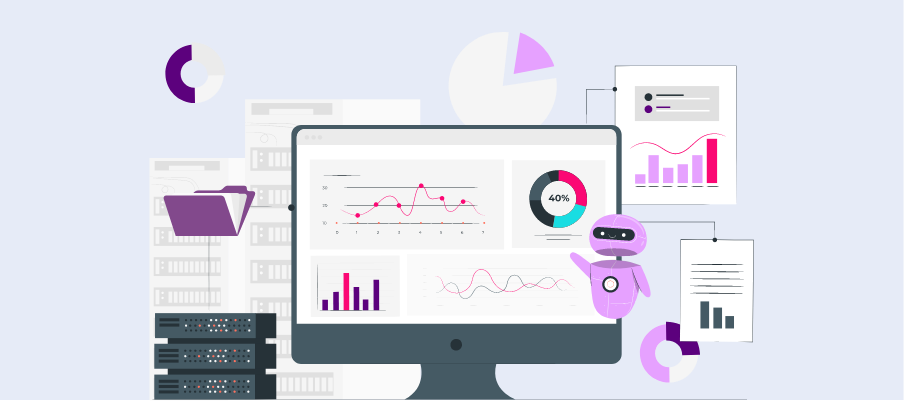Machine Learning (ML): ML algorithms learn from data patterns and improve over time, making them ideal for tasks like predicting expenses and automating transaction categorizations.
How Does AI Automate Bookkeeping?

Bookkeeping is the backbone of any business, ensuring that financial transactions are accurately recorded and managed. It plays a critical role in compliance, budgeting, and the overall financial health of an organization. However, traditional bookkeeping methods are not without challenges. Small business owners and accountants often face time-consuming manual entry processes, human errors, and steep costs associated with maintaining accounting systems.
Enter AI-powered bookkeeping solutions. Thanks to advances in artificial intelligence, businesses can now automate many tedious bookkeeping tasks. But how exactly does AI streamline these processes? This blog will unpack the technologies behind AI bookkeeping, spotlight its most impactful applications, and explore its benefits and limitations.
What is AI in Bookkeeping?
AI in bookkeeping refers to the use of artificial intelligence technologies to perform tasks previously handled by humans, such as recording, categorizing, and analyzing financial data. By leveraging advanced methods like machine learning (ML), natural language processing (NLP), and robotic process automation (RPA), these AI systems can process large volumes of data faster and with greater accuracy than human capabilities.
Key Technologies Driving AI Bookkeeping:
Natural Language Processing (NLP): NLP enables AI to interpret and extract information from invoices, receipts, and other text-heavy documents.
Robotic Process Automation (RPA): RPA simplifies repetitive, routine tasks such as data entry and invoice tracking, ensuring consistency and efficiency.
AI in bookkeeping fundamentally transforms how businesses manage their financials by introducing speed, accuracy, and scalability.
Key Areas Where AI Automates Bookkeeping
AI doesn't just assist with bookkeeping—it revolutionizes the process. Here are the primary areas where AI is making its mark.
- Data Entry and Categorization
Manual data entry is time-consuming and prone to errors. AI eliminates this hassle by:
Automated Receipt Scanning: AI tools like OCR (optical character recognition) extract data from receipts and invoices seamlessly.
Transaction Categorization: AI categorizes expenses and income into appropriate accounts based on predefined rules or historical patterns, reducing errors and speeding up bookkeeping.
- Bank Reconciliation
Matching transactions from bank statements to accounting records is a frequent challenge for businesses. AI simplifies this:
Automated Matching: AI algorithms compare bank transactions with recorded entries for quick reconciliations.
Discrepancy Identification: The system flags mismatches, reducing human effort and ensuring financial accuracy.
- Invoice Processing
Managing invoices can be tedious; AI steps in to handle:
Automated Creation and Tracking: AI generates invoices and tracks payment statuses in real-time.
Payment Reminders: AI-powered tools send reminders for overdue payments, improving cash flow management.
- Expense Management
Tracking and managing expenses is crucial for budget control:
Employee Expenses Tracking: AI tools allow employees to upload receipts, which are automatically analyzed and logged.
Policy Compliance Checks: AI ensures expenses comply with company policies, reducing the risk of non-compliance.
- Financial Reporting
AI empowers businesses with real-time financial data:
Report Generation: AI creates timely financial reports and visual dashboards suited to decision-making.
Forecasting and Analytics: AI analyzes trends and predicts future performance, supporting long-term strategic planning.
- Tax Compliance
Navigating tax regulations is a considerable burden for businesses. AI makes this easier by:
Accurate Tax Calculations: AI ensures tax calculations align with up-to-date regulations.
Tax Filing: AI tools assist with preparing and submitting tax returns, cutting down on errors and workload.
Benefits of AI in Bookkeeping
The adoption of AI-powered bookkeeping comes with several benefits that cater specifically to the needs of small businesses, accountants, and entrepreneurs.
Enhanced Accuracy and Reduced Errors: AI automates data entry and identification processes, eliminating human errors like incorrect number inputs.
Time and Cost Efficiency: AI saves time on repetitive tasks, reducing bookkeeping hours and costs, especially for small businesses.
Real-Time Insights: AI provides up-to-date financial data through analytics and dashboards, enabling faster, data-driven decision-making.
Scalability: AI adapts to business size, from startups with minimal transactions to large enterprises, ensuring flexibility.
Compliance with Regulations: AI keeps track of changing financial regulations, ensuring accurate and compliant tax filing and reporting.
Potential Challenges and Limitations in AI Bookkeeping
While AI brings significant advantages to bookkeeping, it's not without limitations. Here are a few factors to consider:
Costs: Implementing AI-powered bookkeeping may come with initial costs, including training and maintenance.
Data Security: Businesses must ensure data privacy and security when using third-party AI tools.
Lack of Human Judgement: While AI can automate many tasks, certain financial decisions still require human judgement and expertise.
Limited Adaptability: AI systems may struggle to adapt to unique or unconventional bookkeeping practices, potentially requiring manual intervention.
Dependency on Quality Data: The accuracy of AI bookkeeping heavily relies on the quality and consistency of input data; errors in data can lead to inaccurate outputs.
Technical Expertise Required: Businesses may need specialized knowledge or external support to implement and manage AI systems effectively.
Risk of Over-Automation: Over-reliance on AI could lead to reduced critical thinking and oversight in financial processes, which might result in missed opportunities or overlooked errors.
Future of AI in Bookkeeping
The future of AI in bookkeeping is full of potential as advancements in technology push the boundaries of what’s possible. Emerging trends, such as the integration of blockchain for enhanced financial transparency and predictive analytics for forecasting market trends, are reshaping how businesses manage their finances. These innovations promise to make bookkeeping more efficient, accurate, and insightful, enabling businesses to stay ahead in a competitive landscape.
As automation takes over repetitive tasks, the role of accountants is shifting significantly. Instead of focusing solely on data entry and routine processes, accountants are now stepping into more strategic roles. They are becoming advisors, offering value-added services such as financial planning, analysis, and decision-making support.
Looking forward, the industry may move toward fully autonomous bookkeeping systems, where AI handles tasks with minimal or no human input, creating an opportunity for accountants to focus entirely on strategy and innovation.
Final Thoughts
AI is no longer a futuristic concept—it’s here, and it’s revolutionizing the way businesses manage their finances. By automating essential bookkeeping tasks, AI allows small business owners, accountants, and entrepreneurs to focus more on growth and less on operational intricacies.
If you're ready to explore how AI can simplify your bookkeeping processes, consider integrating Ziepie AI-powered tools into your business operations. Discover platforms that offer automation, accuracy, and real-time insights—making financial management smarter and faster.




